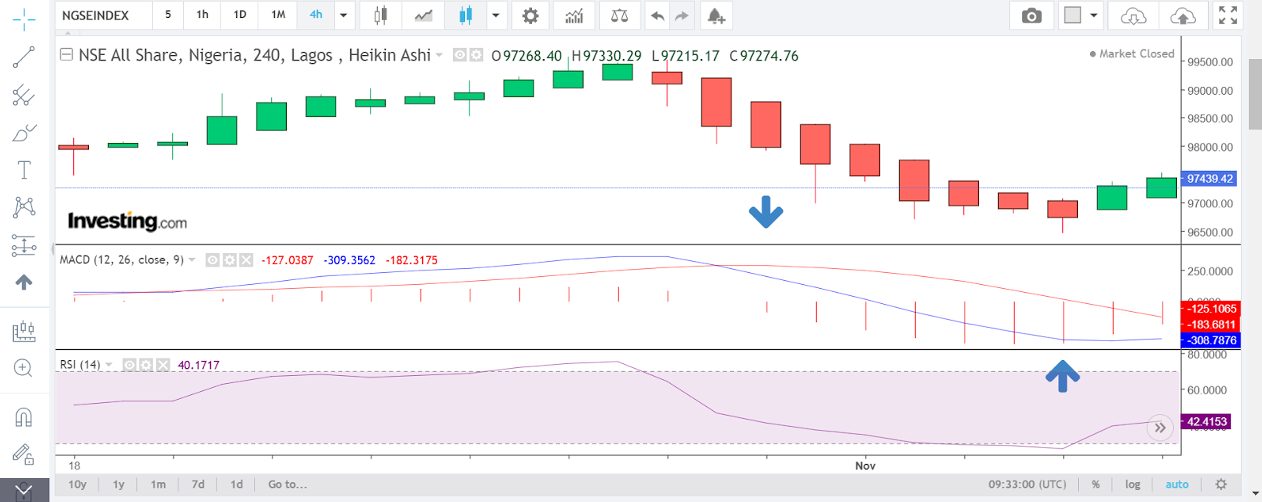CFD Trading In Nigeria



If you’re based in Nigeria and curious about investing but don’t want to buy and hold assets long-term, contract for difference (CFD) trading might be for you.
CFDs allow you to speculate on the price movements of assets like Nigerian stocks, currency pairs containing the naira (NGN), and commodities important to the local economy like crude oil, without actually owning them.
This beginner’s guide will walk you through the basics of CFD trading in Nigeria.
Quick Introduction
- CFDs are a flexible but high-risk way to participate in local Nigerian and global financial markets without purchasing the underlying asset.
- You agree to exchange the difference in an asset’s value between opening and closing the contract. If the price moves as predicted, you profit; if not, you incur a loss.
- Since you’re not limited to local Nigerian assets, you can also explore international markets, from US tech stocks to global commodities like gold, all from the comfort of your home.
- Most CFD platforms offer leverage, meaning you can control larger positions with a small amount of naira, maximizing your potential returns, though this also increases risk.
- CFD trading is legal in Nigeria, but it operates in a regulatory gray area, as there are no specific laws from the Securities and Exchange Commission (SEC) governing it.
Best CFD Brokers In Nigeria
Through firsthand tests, we’ve identified these 4 CFD platforms as the best for day traders in Nigeria:
How Does CFD Trading Work?
CFD trading allows you to trade global markets without incurring the added expense and administration needed to own the actual assets. This is why they are known as financial derivatives.
Leverage is an attractive element of CFD trading in Nigeria when used effectively and with care. You can control and open more significant positions but only commit a fraction of the total value (or margin) required to buy an equivalent number of popular shares like United Capital listed on, for example, Nigeria’s Stock Exchange (NGX).
To demonstrate the opportunities and risks leverage brings, let’s consider a potential CFD trading opportunity on the NSE All Share Index,
The NSE All Share Index is a primary stock market index that tracks the general market movement of all listed equities on the Nigerian Exchange, including those listed on the Growth Board, regardless of capitalization.
If you believe the NGX index will rise, you may consider buying a CFD position. If each CFD contract is valued at Nigerian naira (NGN) 98,000, and your broker requires a 30% margin, then to take a position on 100 CFD contracts, you’d need a margin of NGN 2,940,00 (98,000 x 100 x 30%).
If the NGX rises to 100,000, the price increase will yield NGN 1,000 per contract. By closing your position, you would bank a total profit of NGN 200,000 (100 contracts x NGN 2000), excluding broker fees. But, if the index falls to 96,000, you will lose NGN 200,000.
This highlights the inherent risks of CFD trading; although you get to control increased size using leverage, both the gains and losses are amplified.
As a beginner, take things slow. Start with small trades and focus on learning as much as possible about how the markets move. With time, you’ll gain the confidence to increase your CFD trades and explore different assets.
What Can I Trade?
Trading CFDs provides many opportunities in various financial markets worldwide and in Nigeria:
- Stock CFDs – Where available, you can trade some of the most popular individual and high-value Nigerian stocks listed on Nigeria’s Stock Exchange, such as UBA. Or you could consider trading other stocks from the US, Europe, Asia and elsewhere.
- Index CFDs – The NSE All Share Index can be traded as a CFD, with many traders preferring to trade global market indices to capitalize on a stock exchange’s overall performance rather than trade individual stocks or the local market index. Therefore, you might also consider trading the premier global index CFDs like the Dow Jones and NASDAQ. These indices have high liquidity and trading volume, making the costs generally competitive.
- Forex CFDs – The Nigerian naira (NGN) is a currency traded in the foreign exchange market. A popular NGN currency pair is the USD/NGN (US Dollar – Nigerian Naira), which has reasonable liquidity and offers opportunities for short-term currency traders. However, spreads trading exotic and minor pairs are considerably higher than those for major USD and EUR pairs.
- Commodity CFDs – Critical global commodities such as precious metals like gold, silver and crude oil can be traded as CFDs. Nigeria ranks in the top 20 globally for oil and gas production. Oil, gas, and petrochemical products like fertiliser are vital to Nigeria’s economy.
- Crypto CFDs – The fascination surrounding trading digital assets has grabbed the attention of Nigerian traders. You can trade cryptocurrency CFDs like Bitcoin and Ethereum for access to the volatile world of crypto.
Is CFD Trading Legal In Nigeria?
CFD trading is legal in Nigeria. However, while you can participate in CFD trading, there isn’t a local regulatory body overseeing these specific financial products.
Instead, Nigerian traders typically rely on international brokers with licences from well-established financial regulatory authorities abroad.
How Does Legality Work Without Local Regulation?
Nigeria’s primary financial regulatory agency, the Securities and Exchange Commission (SEC), focuses mainly on the local stock market and specific financial products.
Since CFDs are relatively new and more complex compared to traditional stocks, they have yet to be given direct local oversight. Despite this, Nigerians are free to trade CFDs through international platforms. However, it’s up to you to choose a reliable broker that offers secure trading conditions.
Here are some of the reputable regulatory bodies you’ll see associated with global CFD providers:
- Financial Conduct Authority (FCA) in the UK.
- Cyprus Securities and Exchange Commission (CySEC) in the EU.
- Australian Securities and Investments Commission (ASIC) in Australia.
Is CFD Trading In Nigeria Taxed?
CFD trading profits in Nigeria are generally subject to taxes, although how they are taxed can depend on several factors, including how you classify your trading activity.
Income Tax on Frequent Trading
If you’re actively trading CFDs and making a significant number of trades, like many day traders, the Nigerian tax authorities may view your trading as a form of business income. In this case, profits from CFD trading could be subject to income tax.
Nigeria’s income tax rates vary based on your income bracket, and you may need to report your trading profits as part of your annual income.
Capital Gains Tax on Less Frequent Trading
For traders who make occasional trades or treat CFD trading as an investment rather than a primary source of income, the profits may fall under capital gains tax (CGT).
In Nigeria, capital gains tax is typically set at 10% on gains, but this could apply differently depending on your total financial activities.
Since most CFD brokers available to Nigerians are based internationally, they generally don’t withhold taxes from your trading profits. This means you’ll be responsible for reporting your income and gains to the Federal Inland Revenue Service (FIRS) yourself.
To stay compliant, document each trade, including entry and exit dates, amounts, profits, losses, and any fees paid.Since tax treatment can vary depending on your level of trading activity and other income, a tax professional can help you determine the best way to report your profits, maximize deductions, and stay compliant with Nigerian tax laws.
Tax policies can change, especially as more Nigerians enter the financial markets so keep an eye on any updates from the Federal Inland Revenue Service (FIRS).
An Example Trade
Let’s walk through a trade on the Nigerian NSE All Share Index using a CFD, from start to finish.
Background
Indices are a great choice when trading unfamiliar markets because they often have higher liquidity, volume, and activity than individual stocks, which stock screeners might highlight.
Analyzing indices can be similar to analyzing a currency pair; I examine economic indicators of the country where the index is based, like GDP growth, inflation, unemployment, government debt, and trade/manufacturing data.
You’ll typically find such metrics listed on sites like Trading Economics, or perhaps if you use your filters on the economic calendars, most brokers supply them free of charge.
Technical Analysis
There are hundreds of indicators and custom-made technical indicators (TIs) to choose from. I tend to favor the TIs that have served me well over the years.
Remember, indicators are not infallible or 100% accurate. Their strength often needs to be clarified with their purpose.
If you devise a strategy and stick to your rules, indicators can give you reasons to enter, exit, modify, and rule out trading opportunities. When put in your overall trading plan, these qualities aid your money management and risk, which is often the overlooked strength and purpose of indicators.
In this trade, I made my decisions based on a 4-hour timeframe. I selected two indicators:
- The RSI, which illustrates oversold and overbought conditions,
- The MACD, which highlights trends and momentum and can pinpoint entry and exit points via the EMA crossover.

For traders struggling to decipher the language of candlestick formations like bearish/bullish engulfing, a simplified alternative is available: the Heikin Ashi.
It smooths out the OHLC (open, high, low, and close) of the candlestick’s period to deliver a few simple candles, typically bullish, bearish, and potential turning points like a hammer and doji.
You must develop rapid analytical skills when looking for day and swing trading opportunities. Sometimes, less is more. Learning how to look at a chart and decide about potential price action is essential.
When trading an index, I tend to defer to 1-4HR charts instead of higher timeframes like the daily D1 because I’m trading an opportunity for one or two sessions, not days or weeks.
I applied the RSI and MACD to the 4HR TF in this situation. I’ve highlighted my entry and exit points with blue arrows. I waited for the MACD EMAs to cross as an entry signal and exited when the RSI breached the oversold zone.
You could reasonably argue that I was late into the CFD trade, but I have a trading cliche etched onto my trading grey matter: “The reason for my success is I entered too late and closed too early.”I’m never concerned about leaving missed or potential profit on the table when a trade is closed in profit. I’ve discovered that sticking to my strategy and the rules embedded in my trading plan has served me well.
My deal ticket looked like this:
- I entered at 98,000
- Placed my stop at 99,500
- Exited at 96,850
I took the trade using an index CFD and needed 40% margin. The required margin broke down as follows: 98,000 x 100 x 40% = NGR 3,920,000.
Bottom Line
Nigeria has a vibrant community of traders attracted to the potential profits CFDs offer.
Yet while CFD trading can be a rewarding journey with the proper knowledge and strategy, you must take the time to understand the markets and trade responsibly. Never risk more than you can afford to lose.
To get going, utilize DayTrading.com’s choice of the top CFD trading platforms.
Recommended Reading
Article Sources
- United Capital - Investing.com
- UBA - Investing.com
- NSE All Share Index - Investing.com
- Nigeria’s Stock Exchange
- Nigerian Naira (NGN) - Trading Economics
- Nigerian Securities and Exchange Commission (SEC)
- Federal Inland Revenue Service (FIRS)
The writing and editorial team at DayTrading.com use credible sources to support their work. These include government agencies, white papers, research institutes, and engagement with industry professionals. Content is written free from bias and is fact-checked where appropriate. Learn more about why you can trust DayTrading.com



